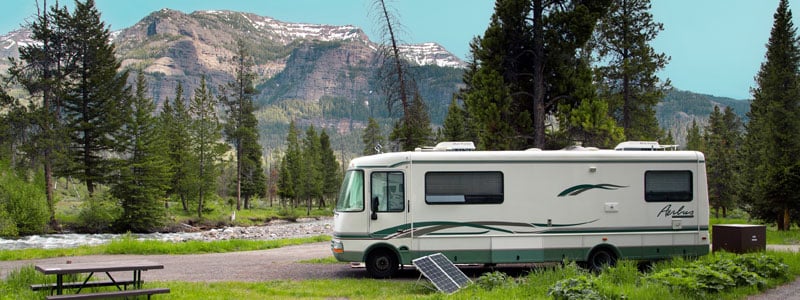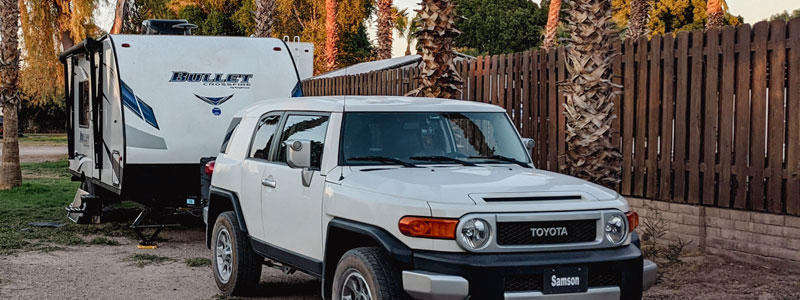Rving can provide real freedom. You can hit the open road and go wherever your heart desires. However, without proper planning, it can be an anchor that weighs you down. Traveling for extended periods without stopping to fuel up or plugin requires a smarter solution. An RV Solar Panel System can keep you going as long as you want, completely off-grid with renewable energy.
RV solar systems can be a complex subject and it’s often hard to know where to start. We’ve compiled a list of the best solar panels and solar panel kits to help you get started. Plus, we’ve included some RV solar panel tips and mistakes to avoid.
How to Choose the Best RV Solar Panels for You
There are several factors to consider when deciding which RV solar panels are right for you. Each has pros and cons, and some factors are mutually exclusive. You must weigh the options and factors of each to decide which aligns best with your priorities. Here are some of the most important considerations.
Wattage
Consider how much power you use and try to get panels capable of generating as much of it as possible. Each option will be capable of generating a certain amount of power per panel, so this will also affect the number of panels you need.
Set-Up
Some panels will be harder to set up while others have very simple installation instructions with few steps. You also have to consider how much room the setup requires and ensure you have enough space for it.
Materials
The materials the panels are made of will determine how efficient they are. The more efficient they are, the more power you get from the same amount of sunlight.
- Monocrystalline: These are the most efficient, but you pay a premium for that level of effectiveness. However, you need fewer panels to get the amount of power you require.
- Polycrystalline: They’re less efficient than monocrystalline but also cost less. Though you will need to buy more to get the same amount of power.
- Amorphous: These are thin, flexible, low-cost, solar panels. They’re much less efficient, requiring a lot more to do the same job.
Portable vs. Permanent
There are a few key differences between portable and permanent solar panels. Here are the benefits of each.
- Portable: They may temporarily attach to your camper’s roof with a hook and loop type fastener. Alternatively, some portable power stations don’t go on the roof. You put the panels in a sunny area when parked at campgrounds and they plug into your camper. RV solar panel kits are best for those who don’t require much power as they are only in use when you hook them up.
- Permanent: Permanent solar panels get mounted directly onto your RV roof. They can collect sunlight all day, even while you drive. This allows them to create much more energy which can be stored in batteries, or solar generators, for later use. This option costs more for solar installation, but it also gives you much more in return.

Top 7 RV Solar Panels
Next, we’ll provide our list of the top-rated solar panels and go over the pros, cons, and details of each. This list will include some of the best solar panels and RV solar panel kits on the market. It will feature top-rated solar panel brands like Renogy, often considered to be the best solar panel company to buy from.
1. Renogy 200-Watt 12-Volt Monocrystalline Solar Panel Starter Kit
This solar panel kit uses the most efficient material and includes everything you need to start your green getaway. When exposed to 5 hours of direct sunlight it produces 1,000 watt-hours of electricity per day.
Included:
- Charge controller
- Hookup Cables
- Z-brackets
- Pre-drilled holes
Pros:
- Has everything you need
- Pre-drilled holes make installation simple
- Up to 22% efficient
- Can add extra panels for up to 400 watts
Cons:
- Some solar panel reviews said customer support was difficult to reach
- The kit costs more than the separate components
- Some users didn’t like the remote and bought a new one for it
2. Renogy Flexible Monocrystalline Solar Panel
This flexible solar panel is great for non-flat surfaces. It’s very lightweight and thin and can handle extreme temperatures.
Included:
- Just the one solar panel
Pros:
- Up to 248-degree flex
- Easy installation
- Great for RVs
Cons:
- Additional items like a solar charge controller, adapter kit cables, and battery must be bought separately.
3. GoPower Overlander 190W Solar Kit for RVs
This kit is the largest charging kit of its kind. It’s durable and comes with a digital solar battery bank display. It’s protected from overcharging to prolong battery life as well.
Included:
- 190W solar module
- 30 amp, lithium compatible, PWM, Dual Bank Bluetooth® solar controller
- 25′ of MC4 output cable
- 25′ of MC4 output cable
- Mounting hardware
Pros:
- Great for long RV trips
- Includes everything you need
- Good in extreme weather
- Water-tight and vibration resistant
Cons:
- Much more expensive than other kits
- Heavy
4. BLUETTI PV200 200W Solar
This is a portable and foldable solar panel. It has a sturdy, durable construction and is simple to set up.
Included:
- BLUETTI PV200 foldable solar panel
- User manual
- 24-month warranty card
- QC card
Pros:
- 4% efficient
- Foldable
- Easy setup
- Positive solar panel reviews
Cons:
- Can’t be used in rain or snow
- Portable unit can only be used when stationary
5. Jackery SolarSaga 100W Solar Panel
This portable solar panel folds up and has a magnetic latch to keep it closed. It has a sturdy kickstand. It’s very light but durable and has very high efficiency.
Included:
- 1 Jackery SolarSaga 100W Solar Panel
- User manual
Pros:
- 3% efficient
- Lightweight and durable
- Magnetic latch
- Foldable
Cons:
- Not waterproof
- Cable doesn’t disconnect
- Portable unit can only be used when stationary
6. Rockpals Monocrystalline Foldable Solar Panel with Kickstand
This is a lightweight but powerful portable solar panel with a kickstand for easy setup. It’s easy to use and compatible with many different devices.
Included:
- 1 Rockpals Monocrystalline Foldable Solar Panel with Kickstand
- Connectors
Pros:
- 5% efficient
- Versatile
- Comes with many adapters
- Works well with clouds
Cons:
- No power bank
- Portable unit can only be used when stationary
7. Renogy 800W 12V/24V Monocrystalline Solar Premium Kit
This high-quality, durable, permanent solar panel kit produces a whopping 3.5-4kWh per day perfect for using more power intensive appliances. It’s made to last and comes completely installation-ready.
Included:
- 8 100W Mono Solar Panels
- Rover Li 60A MPPT Charge Controller
- Cables
- Mounting brackets
- 15A Solar Connector and 60A ANL Fuse
- Renogy Solar Solar Branch Connectors MMF+FFM Pair
- BT-1 Bluetooth Module
Pros:
- 5-4kWh per day with 5 hours of direct sunlight
- 8% efficient
- Protected from damage or distortion
Cons:
- The most expensive one on the list
- Customers said they had to buy other components
- Directions aren’t as helpful as customers wished
Common Mistakes to Avoid
Especially for users new to solar, there are some mistakes that everyone makes at first that should be careful to avoid. Let’s break down the most common.

Not Exposing Solar Panels to Direct Sunlight
Solar panels need direct sunlight to work. If they are shaded, they won’t produce the promised amount t of power.
Laying the Panels Flat on the Roof
Solar panels that lay flat will begin to heat up due to a lack of proper circulation. This will make them less effective as well.
Not Fully Understanding How Solar Panels Work
If you don’t understand how the technology functions, at least the basics. This allows you to understand how many panels you need, the watts necessary, and how much power you can expect to actually generate. Plus, it helps you troubleshoot any issues on the road.
Choosing Cheap RV Solar Panels, Controllers, and Batteries
Wanting to save money is understandable. However, solar panels and related accessories are not the places to cut corners. This is very much one area where you do get what you pay for.
Using Thin Wires
Thin wires will not work as effectively. Using wires that are too thin can cause loss of voltage, overheating, and even cause a fire if you’re not careful. don’t take the chance.
Not Having a Backup Power Source
When relying on sunlight to power your RV, a lack of direct sunlight can cause problems. Having a backup power source is key.
Frequently Asked Questions
Here are some common questions people often have and the answers to each.
How Many Solar Panels Do I Need to Run an RV?
That depends on how much energy your appliances use. You’ll need to figure out how much electricity your motorhome typically uses, pick out your solar panels, then calculate how much it would take to generate your power needs.
Can I Run My RV Air Conditioner on Solar Power System?
Large appliances like an AC require much more power to run. You’ll need a powerful setup, but yes, it can be done. However, only for small amounts of time.
How Many Solar Panels Do I Need to Run an RV Air Conditioner?
That will depend on the AC unit, the outside temperature, and the type of solar panels you have. Use the same calculation process listed above.
What Will a 300-Watt Solar Panel Run in an RV?
It can power many different small appliances like a laptop, fridge, or blender for varying amounts of time. Here’s a helpful chart to explain it further.

Conclusion
investing in an appropriate solar setup for your RV can significantly elevate your boondocking adventures, allowing you to travel further without needing to stop for fuel or power connections. By grasping the key considerations such as wattage, panel materials, and installation options, you can select the ideal solar panels for your RV. Avoid the usual pitfalls, and embrace the freedom of off-grid travel confidently with your chosen solar setup.







